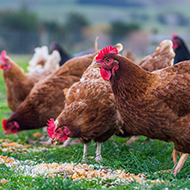Vets urge vigilance as poultry restrictions lift

"This will be welcome news for bird keepers across the country who have put great effort into keeping their flocks safe this winter."
The UK’s chief veterinary officers have urged vigilance following the relaxation of the Avian Influenza Prevention Zone (AIPZ) on Saturday (15 May).
The AIPZ was first introduced in November 2020 to protect flocks against the disease circulating in wild birds. Under the AIPZ, keepers with 500 birds or more were required to restrict access to all non-essential people on their sites and maintain strict hygiene and biosecurity measures.
Over the weekend, the APHA lowered the risk of avian influenza in poultry with good biosecurity to ‘low’. Therefore the mandatory requirements introduced as part of the AIPZ - and the additional biosecurity measures introduced on 31 March - have been lifted.
In a joint statement, the Chief Veterinary Officers from England, Scotland and Wales appealed to keepers to stay vigilant for any signs of disease in their birds and seek advice from their vet if they have any concerns.
“This will be welcome news for bird keepers across the country who have put great effort into keeping their flocks safe this winter,” they said.
“We have taken swift action to contain and eliminate this disease, and we urge all bird keepers – whether they have just a few birds or thousands – to continue to do their bit to maintain strict biosecurity measures on their premises so that we do not lose the progress that we have made over the past few months. Low risk does not mean no risk.”
A ban on poultry and bird gatherings has also been lifted, including pigeon gatherings organised for races from mainland Europe. Organisers must notify the APHA a minimum of seven days before the event and comply with the provisions of the new General Licence.
The government has advised that risk to human health from the H5N8 virus strain is low and from the H5N2, H5N5 and H5N1 virus strains is very low. Food standards bodies also stress that the disease poses little risk for UK consumers and does not affect the consumption of poultry products.



 The latest
The latest